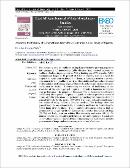| dc.contributor.author | Max, Ajanga | |
| dc.date.accessioned | 2024-01-18T10:51:01Z | |
| dc.date.available | 2024-01-18T10:51:01Z | |
| dc.date.issued | 2021-06 | |
| dc.identifier.citation | Ajanga, M. (2021). Allocative Inefficiency of General Hospitals in Poor Countries: A Case Study of Uganda. East African Journal of Interdisciplinary Studies, 3(1), 128-143. | en_US |
| dc.identifier.uri | DOI: https://doi.org/10.37284/eajis.3.1.346 | |
| dc.identifier.uri | https://hdl.handle.net/20.500.12504/1555 | |
| dc.description.abstract | The increasing costs of healthcare arising largely from the growing population
and emergence of non-communicable diseases have exerted pressure on
healthcare budgets in poor countries. With a funding gap of 7% to realize WHO
recommended target of 15 percent of GDP in Uganda, there is a need for
hospitals to be efficient in allocation of financial resources in order to provide
the required level of healthcare services. Most studies on Uganda have focused
on the technical inefficiency of general hospitals and evidence on their allocative
inefficiency is limited. Understanding the sources of inefficiency in the
allocation of finances in general hospitals in Uganda is important to improve
their performance. The purpose of this study was to determine the allocative
inefficiency of the general hospitals in Uganda in order to provide a source of
misuse of public allocations to a particular general hospital. Panel data from 22
general hospitals for the period 1997-2007 were used. Allocative inefficiency
was estimated using Stochastic Frontier Analysis. The findings show that
general hospitals are systematically allocatively inefficient in distributing the
public funds given to them. The allocative inefficiencies value is high on
payments of employee benefits (34.8 percent), followed by the purchase of drugs
(29.2%) and lastly, costs on utilities like electricity and water (14.1%). To
address the existing allocative inefficiencies, general hospitals in Uganda can
improve the process of hiring of labour and management of staff payroll; monitor
procurement of drugs, and reduce wastages in the use of utilities. | en_US |
| dc.language.iso | en | en_US |
| dc.publisher | East African Journal of Interdisciplinary Studies | en_US |
| dc.subject | Efficiency | en_US |
| dc.subject | Drugs | en_US |
| dc.subject | Medical staff | en_US |
| dc.subject | Patients | en_US |
| dc.subject | Hospitals | en_US |
| dc.subject | Utilities | en_US |
| dc.title | Allocative inefficiency of general hospitals in poor countries: a case study of Uganda | en_US |
| dc.type | Article | en_US |

